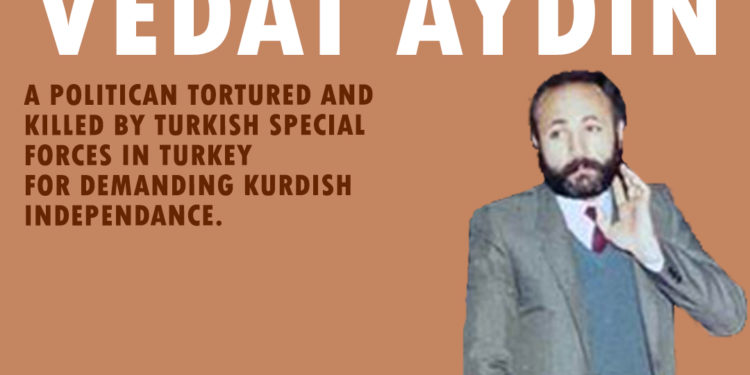The Turkish aggression in the 90s against Kurdish struggle for independence was one of the most violent periods of Kurdistan’s recent history. And as a part of a Turkish political tradition, the Turkish state started to use its centuries-old tactics: mass killings and forced migration of ethnic groups.
It all started with one murder. It was the mother of political assassinations at that time period: Murder of Vedat Aydın.
THE MURDER OF VEDAT AYDIN
During the time, Vedat Aydın is the head of People’s Labor Party (HEP) Amed (Diyarbakır) branch. He is a prominent figure and widely respected politician; when he is taken under custody by the Turkish police on July 5th, 1991. The Turkish state’s oppression against Kurdish politicians was immense and detaining and even torture was common at that time.
The part of Vedat’s story which takes a different turn from normalised fate, occurs the following day, Turkish officials deny that Vedat Aydin is in custody. Whilst there are reports of Turkish counterguerrilla units killings in Şırnak, Cizre and Mardin; it is unexpected that a prominent figure such as Vedat, would be targeted.
On July 7th an unidentified body is found under a bridge in Maden, a district of Elazığ province about 50 kilometres north of Amed. The body shows signs of extreme torture and multiple gunshot wounds. Aydin’s family rushes to the morgue in Maden and identifies the body.
TURKISH POLICE PREPARED FOR A MASSACRE
The murder hits the Kurdish community like a bomb, especially Amed, Vedat Aydin’s hometown.
The Turkish authorities hand Vedats’s body to his family three days later; the excuse being “juridical processes”.
But this was not so innocent. The Turkish state had its own preparations for the funeral; and when everything was set, they paved the way for the funeral.
More than a hundred thousand people attended the funeral. The ceremony was led by prominent figures of Kurdish politicians as well as human right defenders and intellectuals. Vedats’s coffin was brought to Sümer Mosque in central Amed. After prayers, the crowd walked to Mardinkapi Cemetery for the burial.
The crowd was stopped before the cemetery’s entrance by the Turkish police stating that they won’t let such a large crowd enter the cemetery; amidst the talks to remove the police barrier, shots were heard.
The masked special forces opened fire against the crowd. There was immense panic. Gunshots continued for 3-4 minutes. Four people were killed on the spot. Several were wounded and taken to the hospital.
After the first attack police removed the barrier and let the crowd move to the cemetery. The crowd gathered back again.
Vedat was buried after a short speech by his brother Deniz Aydin.
PEOPLE WERE DELIBERATELY TARGETED
Assuming the danger to be over, the crowd dispersed and most people started walking to the city centre. They find the road blocked by Turkish police. This time there were more policemen, more special forces and armoured vehicles. The police let the crowd walk to the city in small groups. After most people passed the police barrier, only a few thousand people were waiting for the police’s permission to walk to the city centre.
First, there were three shots. Then hundreds of armed policemen started to open fire on the remaining people. A helicopter and armoured vehicle were escorting the attack. People who were trying to flee the area were captured and beaten by Turkish police.
MPs Ahmet Türk, Orhan Doğan, Hatip Dicle and other Kurdish politicians were tortured along with journalists and human rights defenders.
The attack lasted around 20 minutes. It left 23 people dead and more than two thousand wounded. 19 were buried at night time, only 4 families were granted permission for a proper funeral.
23 WERE KILLED AND NO ONE APPEARED BEFORE COURT
No Turkish official or policemen appeared before the court for the killing of innocent civilians. The murderers of Vedat Aydin were never found.
The murder of Vedat Aydin was the beginning of an era. An era of political murders and extrajudicial killings. Between 1991-99 several thousand Kurds were killed, including MP Mehmet Sincar. About two million Kurds were forced to migrate, about 17 thousand villages were burned to the ground.




